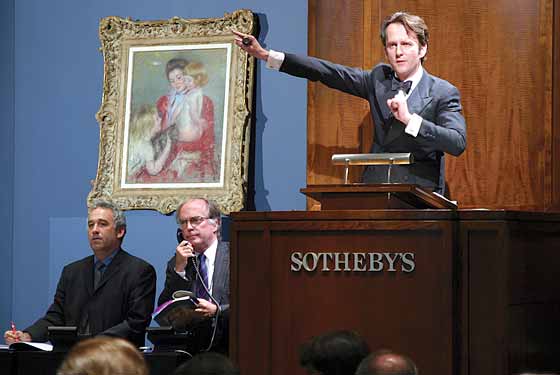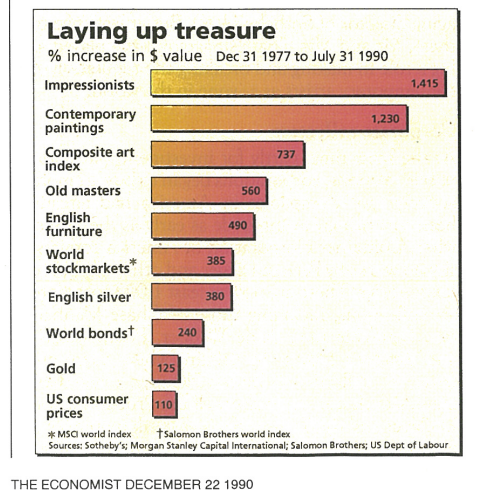| |
Private Sale
There is more money in the world than great paintings by John Jan Popovic

Private Sale
Private Sale
As Tom Wolfe wrote in 1975 that, at the end of 1950s, the serous art world has been restricted to no more than 10,000 people in 8 cities around the globe. Now the figure may be 100 times bigger, but still not large.
It is a fantastic and complex field which takes years, sometimes decades, to fully understand the nuances, the transaction procedures, the laws, import guidelines and what information to disclose and what not to disclose -- and when and to whom. Knowledge, discretion and correctness are of vital importance when dealing top fine art.
Merril Stevenson wrote in the Economist, more than 20 years ago: "The art market is less perfect than most financial markets. Products are one-offs and less fungible than bonds, for instance. That should give the seller more control over prices. But art is also less liquid: the seller cannot simply unload his asset whenever he wants to, or the buyer buys it, is if it is an IBM share. Dealing costs in art can be high. And less information is available in the art world.."
A) Why buying a painting via auction is not sometimes such a good choice?
a1. Sometimes paintings are not by the artist claimed in the catalogue. Often they can look attractive to the untrained eye but are in bad condition and have been cleverly repainted by a restorer. If you buy a unreliable artwork, unless you can prove it is an outright fake which is difficult, you rights of recourse against the auction house are limited. That’s why the small print is so small.
a2. Occasionally during the auction the dealers practice 'chandelier bidding'. A practice, especially by high-end art auctioneers, of raising false bids at crucial times in the bidding process in order to create the appearance of greater demand and to rise the final price.
Another sinister practice is a 'bidding ring', when a group of bidders collude in an auction in order to gain greater profit by depressing competition.
But, it is also possible to buy well at auction, obviously only with independent expert advice behind you. Otherwise it is just gambling.
There is not enough time to check the estimated price, auction room condition reports may be subjective and so on.
a3. Dealers put their reputation on the line with every picture sold. They will normally buy- back or sell on for you a picture when you decide to resell it. If you develop a good relationship with one then they are normally generous with their advice.
a4. Buying a painting at auction is like buying a car or a house at auction. You have to know what you are doing or you can make some expensive mistakes. As easy as it may look, buying at auction is a complicated activity.
a5. The auction house must give their sale results including buyers and sellers names to the TAX authorities. Some sellers prefer to keep their affairs private. The private sale will protect your privacy and avoid the big publicity a high price always makes at auction.
------------------------------------------------------------------------------------------------
B) Should the owners sell the painting at auction or sell it to or through a dealer?
In 2001 the scam, which scandalised the art world, is estimated to have overcharged Sotheby's sellers more than $40 million.
b1. If the art work remains unsold lot at public auction, YOU HAVE A PROBLEM, since for many years it will be difficult to offer the painting on the Fine Art Market. With the silent private transaction this is not a case.
For example, Elisabeth Taylor failed to sell her van Gogh in December 1990 when bidding at Christie's fizzled out at £5.8m.
b2. Will you get more for the painting at public auction? It depends what you have. For a medium quality painting auction is often the best place for it. Dealers probably wouldn’t want it, and at auction it will probably find its market.
b3. With a famous painting it is sometimes better to use a dealer. Many of the leading buyers prefer to remain anonymous and keep their buying discrete.
b4. The auction room give their sale results including buyers and sellers names to the TAX authorities and some buyers prefer to keep their affairs private. For something good they prefer to pay a little more to a dealer for the sake of privacy and avoid the big splash a high price always makes at auction.
b5. So, for a good picture a dealer can often get more for a painting. A discrete sale also suits some sellers.
b6. The deal is conducted at a slow and measured pace and often can be structured in a way beneficial to the seller. Selling at auction is the opposite where everybody has to rush into making decisions in the limited time available before the hammer comes down.
------------------------------------------------------------------------------------------------
C) Should the owners sell the painting on Internet public forum?
I will tell what a serious buyer will say!
If the art work remains unsold on the INTERNET SALES FORUM for more than one or two months, one has created a problem for him or herself, since it will be much more difficult to CONCLUDE the silent private transaction.
This is why:
c1. The buyer will wonder why the painting is not sold yet, if it is so hot?!
c2. There is a proverb:"A girl that is publicly offered to all is not exactly expected to get married any time soon!" Sometimes..... with the sales of paintings it is the same.
c3. Internet in itself has a public character. This public character does not fit a silent, private and exclusive sales since it's opposite in it's nature.
---------------------------------------------------------------------------------------------
In the end neither dealers nor auctioneers can flourish long at the others' expense. When auctioneers do well, the size of the art market and prices increase, from which galleries benefit too. Dealers, for their part, are constant buyers who give auctioneers liquidity and, often prestigious credentials for the art they auction. The two are partners, like it or not, in something other than zero-sum game. Its rules are subtly changing as its parameters expand.
---------------------------------------------------------------------------------------------
Bibliography & links
http://www.oldmasters.net/essay-5.html
http://www.slate.com/id/2144185/
Ronald Lauder paying $135 million for a Gustav Klimt
for example, a J.M.W. Turner view of Venice sold at auction at Christie's in London on May 29, 1897, for $35,000 and then sold at Christie's in New York last April 2008 for $35.8 million
---------------------------------------------------------------------------------------------
|
|








